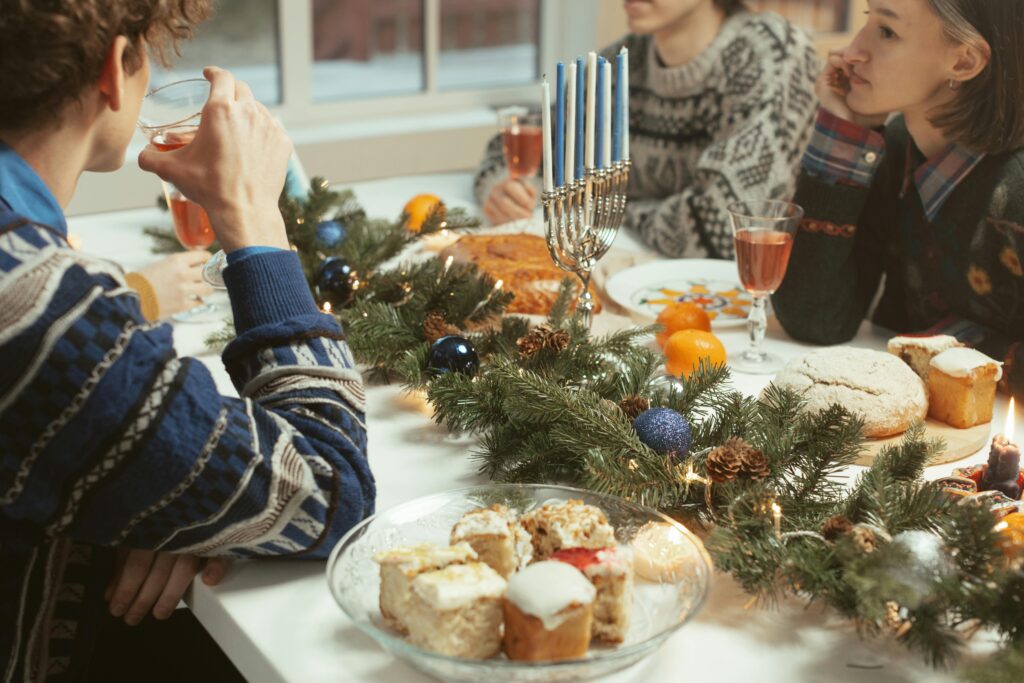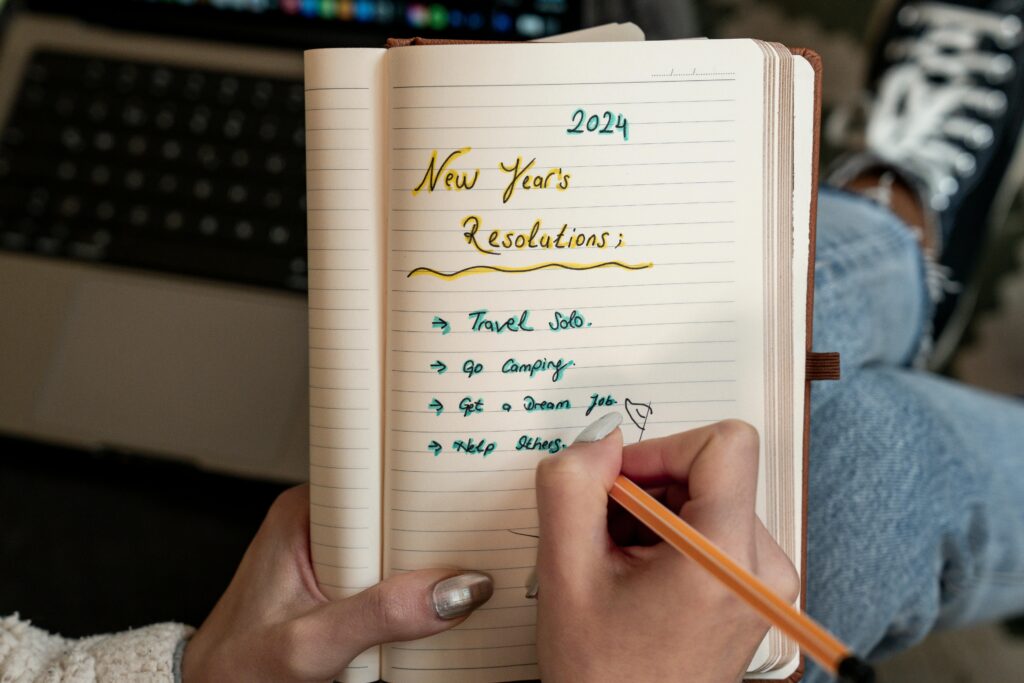December is in full swing – the twinkling Christmas lights are up around town, Christmas trees are decorated, and you can’t go into a single store without hearing Mariah Carey or losing Whamageddon. Despite the joy and wonder of the decorations and events – you may be feeling a little more like the Grinch the closer you get to the holidays.
When we really think about it, the holidays have all the ingredients of something that should make you excited and less stressed – time off work (for most), something to look forward to, time spent with loved ones. So, why does it feel like most people are on their last nerve during the holiday season?
Why are Holidays Stressful?

Photo by Helena Jankovičová Kováčová
Despite all the things that make this time of year special, some of those things can also be the perfect combination for increased stress, particularly in the lead up to Christmas and the Holidays. In fact, a study by Mutz (2015) found that the pre-Christmas hustle is what caused the decline in mental well-being many participants faced rather than the holidays themselves.
So, if 62% of people are feeling very or somewhat elevated stress levels during the holiday season, there has to be more to this right? What actually causes this increase in stress you feel when you’ve heard All I want for Christmas is you for the 1000th time?
What Causes Holiday Stress?
What causes the increased stress you feel is going to be different for everyone, but here are some of the top reasons I often see in the therapy room:
1. Financial Stress & Gift-Giving Pressure

Photo by Photo By: Kaboompics.com
While this has always been a main issue around the holidays, recent years have put even more limits on our pocketbooks when it comes to cost of living. So once the holidays roll around, the stress, depression, and anxiety that may already come up for you around money gets amplified by the pressures of gift-giving. On top of that, many people do have financial trauma or past experiences relating to finances that can be easily triggered by the expectations around spending money and gifting.
Part of overcoming this particular stress at this time of year involves getting unstuck from the thoughts and expectations that you need to live outside your means in order to participate in the holidays (easier said than done, I know). A therapist who understands the impact of finances and financial trauma on your well-being can be an important part of managing this particular stressor during the holidays (and all year long).
Stacey has experience with financial trauma and the impacts of finances on mental health and will be furthering that education by completing her Trauma of Money Certification in 2025.
Low and no cost gifts and events are a great way to enjoy your holiday season without adding pressure (and debt!). Some ideas include:
- Using your skills! Make something special for your loved ones. This could mean baking them cookies, knitting a hat, painting a picture, or DIYing your holiday cards.
- Take advantage of the free events where you live. In Guelph, this can be taking your family to Sparkles in the Park which runs mid-end of December every year and is a PWYCA donations event. Head to a tree lighting ceremony, go skating, window-shop (or set a budget) at holiday markets.
- Offer your time to help your loved ones with something they don’t have time for or find difficult to do themselves. This can be painting a room, babysitting, taking down their Christmas decorations.
2. Over commitment

Photo by Yan Krukau
I get it, it’s sooo hard to say no to all the events that pop up around the holiday season. Work Christmas parties, family gatherings, gift-exchanges with friends, not to mention the things that you enjoy and want to squeeze in like skating at city hall and browsing the holiday markets. It can be easy to get caught up in doing it all at the expense of your energy and mental health.
If you find yourself committing to multiple events in one day, filling every second of your weekends in December and needing to have a strict down-to-the-minute Christmas day schedule then chances are you’ve overcommitted, and it’s no wonder you’re stressed! While it can be so difficult to say “no” especially this time of year, if you’re feeling extremely worn out and like you’re constantly running around, it may be time to consider dropping a ball or two to allow yourself some time to slow down. This could be as easy as asking to celebrate with both sides of your family on different days rather than squeezing in both on Christmas Day, politely declining the invitation to that third holiday party, or planning ahead getting your Christmas shopping done early.
Things can feel very immediate during the holiday season, but you can still find time to rest and honour your energy limits. If you don’t have time to make a fourth side dish for Christmas dinner, is that really so bad? Especially if it means you don’t have to rush around?
3. Expectations

Photo by Nicole Michalou
A lot of people go into the holidays having certain expectations of the season and events themselves. Whether these are expectations you place on yourself or ones that have been inherited from your family and others (think that long list of holiday traditions). While it’s great to look forward to particular parts of the holiday and want everything to go well, people to like their gifts, and to have a truly merry Christmas, we need to leave space for some of these things to be true while others may just not go your way.
4. Family Relationships & Patterns

Photo by Yaroslav Shuraev
Family is a big one, and likely the first stressor many would name when talking about holiday stress. Whether your relationship with your family is good or rocky, the demands that family often place on us can be difficult to manage and even more difficult to set boundaries around when we’re feeling overwhelmed.
If your family relationships are strained or there’s particular family members you only see during the holidays that you don’t have the best experiences with, this can cause a lot of anticipation about what will go wrong. Will old patterns show up again? Will I get comments about my weight, disability, partner, plans for a family? Will we have to babysit someone when they drink too much? There are so many dynamics even within families with strong relationships, that just seem to hit their breaking point around Christmas. Everyone’s stressed, pressed for time, and expecting things to be perfect – it makes sense.
At the same time, regardless of your connection with your family, if you are spending time with them over the holidays and there are things you don’t like that they do or ask about – you can practice setting boundaries. Especially if it will end up costing you the enjoyment of the rest of the day or even creep into the New Year as can often be the case when family comments on weight, when you’re having a kid, or your decision to change careers. It’s hard, and you may face some pushback but setting boundaries can help alleviate some pressure. “I feel tempted when you continuously offer me an alcoholic drink. I’ve been sober for x and would love your support,” or “I don’t believe in commenting on other people’s weight/appearance, I would appreciate it if we could talk about something else.”
5. Burning Out

Remember when we talked about overcommitting? Yeah, burning out is the consequence you may experience if you overcommit to the detriment of your need for rest and care. While this may not entirely come from your dedication to attending every holiday party you get invited to, it certainly can play a big role if burnout has been creeping up on you throughout the year.
When you power through the whole year at work (sometimes multiple jobs, long hours and/or high-stress careers), try and manage your relationships and life responsibilities, maybe parenting or school on top of that all with just a week or two of vacation spread throughout the year you’re bound to hit a wall. Unfortunately, that wall may be the holidays when additional pressures are added to our list of responsibilities to fit…somewhere??…in our already packed schedules.
If you’re already feeling burnout at your back, you’re bound to be more stressed, overwhelmed and generally on edge around the holidays. And from my own observation, this has been one of the more common experiences with holiday stress in recent years. You’re tired. Capitalism keeps capitalism…ing? And you’re stretched thin on time, energy and finances. It makes sense.
If this sounds like you, this is your reminder that you can take a step back, set some boundaries, prioritize rest, or say no to a holiday commitment or two.
6. Reflection & Comparison

Photo by Ahmed ツ
We do this weird thing at the end of the year and ahead of New Years – we reflect – but in a comparison heavy, “how can I do more?”, “What were my shortcomings this year?” kinda way. Which, don’t get me wrong, can have its pros for motivation and drive to better yourself for the right reasons. However, it’s the comparison piece that can really be tricky and eat away at us the longer we fixate on it.
Now, we all know “comparison is the thief of joy” and yadda yadda. I’m not necessarily going to spew the same old stuff you already know about comparing yourself to others, you get it. At the same time, our New Years traditions of setting resolutions and year-long goals can really feed that comparison monster (even if it’s comparing yourself to YOURSELF). Add to that the holidays when we are spending time with family and friends, some of whom may be your biggest critics. You’re sitting at the table with Uncle Joe telling you his opinions on your weight, your kids, your career and now a couple days later you’re going to set your intentions for the New Year? WHO DECIDED THAT WAS A GOOD IDEA?!
For some, this can be one of the biggest stressors of the holiday season, the time they take to reflect on what they did and didn’t accomplish in the past year and look towards setting new goals for the year to come. It can open old wounds, feed the “I’m not good enough” core beliefs, play up your imposter syndome…it’s a lot. But get this, you don’t have to participate. If this is something that really causes you stress, don’t do it. Sure, it can be hard not to reflect in some ways this time of year but you don’t need to pressure yourself into goals or assessing your failures and accomplishments of the last year. If you still want to set goals, set shorter term SMART goals, focus on things that make you feel good about yourself and try to ensure they’re rooted in your values.
How to Cope With Holiday Stress
Okay, so you know why you’re stressed around the holidays, but what can you do about it? Well… a lot of things actually (even though I know it doesn’t feel like it).
1. Set Boundaries (with others, your finances, etc).

Photo by Vie Studio
While we may want to visit family and loved ones and engage in all the traditions of the holiday season, we still may have our limits. Part of managing stress around this season is to know what those limits are and setting boundaries with people (and yourself) to honour them. This may look like:
- Keeping to a budget or making homemade gifts despite the pressure to go all out.
- Recognizing that you don’t have to share any information you don’t want to. So while your parents or other family members may want to know when you’re having kids, who your new partner is, what’s going on with your weight or health…you don’t have to answer. Set your boundary, change the subject and move on.
- Knowing when you need to take a break or walk away. Sure, you’ve committed to dinner or sleeping over at your parents for Christmas Eve but you can take a break. Feeling overwhelmed? Anxious? Started to feel that stress pulling your shoulders closer and closer to your ears? Take a walk, go to another room, offer to run an errand, whatever it is you need to do to take a breather, rest, and honour your need for some space.
2. Keep to Your Routine.

Photo by Yan Krukau
The first thing to go over the holidays is your routine. Your schedule is jam-packed with events and errands so obviously there’s no time for proper sleep, keeping to your daily walks to get some sun (or faint whisper of daylight, here in Canada), and eating meals? Who has time for that?
But we know that these routines are essential to keeping stress at bay, improving our health and mental well-being, so why are we sacrificing them in a time of peak stress? While I know it can be difficult to give up a few extra minutes of time when there’s so much to do – trust me, you’ll see the positive impact it has on how you feel if you maintain those routines the best you can.
3. Say “No.”

Photo by Vie Studio
I get it, saying “No” is hard. Especially when we feel socially obligated to accept every invitation, host dinner, participate in every gift exchange and offer to run errands when your family member inevitably forgets half the ingredients for your Christmas dinner. If you’re already feeling stress, at your limit and feel like taking on one additional thing is going to push you over the edge, “No” is going to become your best friend. While some people may not understand or push back if you say no to something, remember, it’s not your responsibility to manage their emotions and behaviours. If this is what you need to do to minimize your risk of burnout, prioritize rest for your chronic illness, or just generally be able to enjoy your holiday – it’s worth that momentary discomfort.
4. Talk to Someone.

Photo by SHVETS production
Holiday stress can just be a yearly thing for some people – taking on a bit too much around Christmas, setting expectations a bit high, but once the New Year comes they’re back to feeling pretty good. However, for others this time of year can bring up past experiences, feelings of loneliness or grief or other difficult to manage thoughts and emotions. When this happens, it can be helpful to talk to someone. You don’t have to manage those alone, in addition to your friends and family the support of a therapist can be a great way to set aside time for you to care for yourself during this busy season.
5. Be Intentional About Downtime.

Photo by Vincenzo Malagoli
Just like sticking to your routine, it’s important to be intentional about rest. Even if it means you literally schedule it into your days around your busy calendar of events and errands. Being proactive about downtime can be a big stress buster. Giving yourself dedicated moments that aren’t taking away from some other thing on your list where you can just relax, nap, meditate, or watch a movie. It helps relieve some of the pressure, slows you down and lets you enjoy what the season has to offer rather than letting it fly by in a cloud of gift wrap and long car drives between families.
6. Assess Your Expectations.

Photo by NastyaSensei
I’m going to talk directly to my perfectionists and people-pleasers here. I want you to take a minute ahead of the busy holiday rush, and assess your expectations. What does that mean? While you may not be actively aware of the pressures you’re putting on yourself (or that you’re taking on from others), you probably have some sort of expectation about how you want your holidays to look.
Whether that’s the picture-perfect family Christmas dinner with no bickering, a delicious meal, and everyone just happy to be spending time together, or maybe it’s throwing the best holiday party – one people will talk about for years, or perhaps it’s just that you bought to perfect gifts for everyone on your list. By themselves, there’s nothing wrong with these desires. However, if you notice that you’re feeling way too invested in everything going perfectly or making sure everyone’s happy or else the entire holiday will be ruined – that’s when we may need to take a step back and see how we can reframe those expectations.
In therapy, I often remind people that two things can be true at once, a concept that’s prominent in Dialectical Behaviour Therapy (DBT). You hoping for a lovely conflict-free Christmas dinner with your family is great and a totally normal thing to want, AND if something doesn’t go to plan your entire holiday isn’t ruined. You can be disappointed that things didn’t work out exactly how you wanted AND you can be grateful for the time with family, the joy on your kids faces, the slower moments watching Christmas movies.

Photo by Nubia Navarro (nubikini)
So, if you’re someone that’s noticing a lot of stress ahead of the holidays – know that what you’re feeling is normal. Capitalism, family expectations, even holiday traditions can all make this time of year feel more rushed and overwhelming. It’s not just you. However, there are things you can do to help manage that stress. You have more control than it can sometimes feel like. If you feel like that stress is too much, other feelings are coming up that you find difficult to manage yourself or your stress is following you into the New Year you may benefit from the support of a therapist like Stacey here at Good Thanks Therapy who can provide a space for you to explore your relationship with the holidays and the stress that comes with it.



